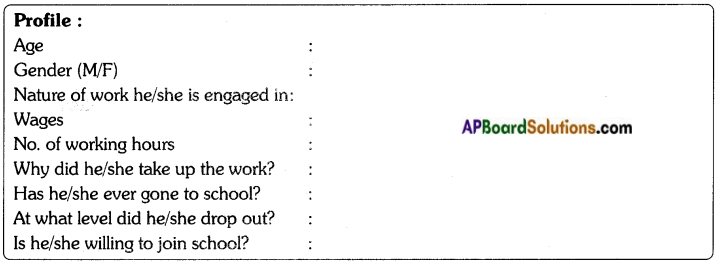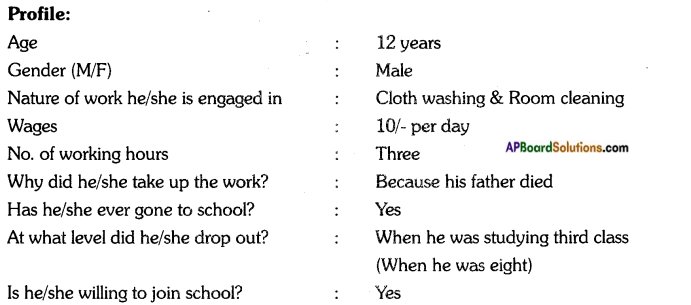AP State Syllabus AP Board 8th Class English Textbook Solutions Chapter 2C Reaching the Unreached Textbook Questions and Answers.
AP State Syllabus 8th Class English Solutions Chapter 2C Reaching the Unreached
8th Class English Chapter 2C Reaching the Unreached Textbook Questions and Answers
Comprehension
Answer the following questions.
Question 1.
Complete the following table based on the above article.
Answer:
| Name of the child | Age | Nature of work for which engaged |
| Romesh | 14 years | Rag picking |
| Shanti | 9 years | Cooking, moping, cleaning and washing clothes |
![]()
Question 2.
Who rescued the two children ? Where did they take them to ?
Answer:
Some rescuer called 1098 helpline and Romesh got a helping hand from “The Child Line”. He is now one of the beneficiaries of Andhra Pradesh State based project for the Elimination of Child Labour. In the case of Shanti, the neighbours informed the “Child Labour Enforcement Team”. She was rescued and is now placed in a girls’ transit home.
Question 3.
Many households in your neighbourhood employ children to do the menial jobs. What will you do to save those children?
Answer:
At first I will talk with the owners who employ children to do the menial jobs and make them realize that they are doing wrong. I will make them know that those children are like their own children. I will ask them to educate those unlucky children and feed them well if they can. Next, I will inform the “Child Labour Enforcement Team” about those children. Thus, I will try to save them.
Question 4.
What is the role of CRY?
Answer:
CRY is an organization that partners some basic level organizations working for children, their parents and communities. CRY’s role is that of a bridge between child developmental organizations and people working for marginalized children. They gather the support, money and time of the Indians around the world and thousands of field workers across India who struggle to enrich the lives of children.
Question 5.
Two organisations are working to save the destitutes. What are they?
Answer:
The organisations that are working to save the destitutes are:
- Child Rights and You (CRY) and
- Save our Soul (SOS)
![]()
Question 6.
How does SOS work?
Answer:
SOS provides family-based care for children. It advocates the concerns, rights and needs of children. SOS focuses on strengthening families, helping them to stay together during difficult times and provide the best care possible to their children. SOS children’s village experts work with families to help them develop a wide range of skills, from household budget planning, how to get a job and earning a living, to bonding with a child or young person and learning to create a stable family life at home.
Study Skills
Read the following passage extracted from the story ‘Oliver Asks for More’ and the notes made on it.
The members of this board were very wise and philosophical men. As they turned their attention to the workhouse, they discovered that it was a regular place of public entertainment for the poorer classes. It was the place where they had breakfast, dinner, tea, and supper all the year round and free; where it was all play and no work. This was really shocking state of affairs, they were of the opinion that the poor should be given only two alternatives: Either to starve quickly outside the workhouse, or gradually inside the house, view, they decided that the inmates of the workhouse would be issued three meals of thin gruel a day, with an onion twice a week.
For the first six months after Oliver Twist was moved in, the system was in full operation. As a result, during this period, the number of workhouse inmates got smaller, and the inmates themselves shrank in size and became thinner.
Observe the notes made from the above passage.
1. The board
a. very wise and philosophical men
b. their attention to the workhouse
c. was a regular place of public entertainment
i. had breakfast, dinner, tea and supper
ii. all play and no work
2. The decision
a. to starve quickly outside the workhouse
b. gradually inside the house
i. issued three meals of thin gruel
ii. an onion twice a week
3. Result of the decision
a. the inmates of the work house got smaller
b. shrank in size
c. became thinner
Now, read the passage Child Rights and You (CRY) once again and make notes with another suitable title.
Answer:
1. CRY
a) an organisation
b) believes that children are citizens and they have their own rights
c) doesn’t believe in charity
2. Nature of work
a) doesn’t run schools or orphanages
b) partners some basic level organizations working for children, their parents and communities.
3. The role of CRY
a) bridges child developmental organizations and people working for marginalized children
b) gathers the support, money and time
(i) of the Indians around the world – who struggle to enrich the lives of children.
(ii) of the thousands of field workers across India – who struggle to enrich the lives of children.
![]()
4. CRY’s achievements:
a) Freed more than 1 lakh children from (i) hunger (ii) exploitation (iii) illiteracy
b) prevented child labour in 648 villages
c) liberated 1152 villages from child marriages
d) made 21,676 out of school children join schools
Listening
Homeless Child
No mother no father neither shoes nor a bed
He lives in a street
on pavements of a road
He is just ten
looks pale and thin.
He has so small a dinner
sometimes, he dines on the smell.
And even if he is starving to death
nobody comes to feed him.
As the sun rises and rays shoot him,
he is exposed to child labour.
Tears start rolling down his cheeks
there is nobody to comfort him.
And even if he is dead
There is nobody to worry about him.
Answer the following questions.
Question 1.
What is the song about?
Answer:
The song is about an orphan who is a child labourer.
Question 2.
Where does the child live?
Answer:
The child lives in a street and on pavements of a road.
Question 3.
How old is the child in the poem?
Answer:
The child in the poem is 10 years old.
Project work
![]()
In your village/city you may come across children who are working in some house¬holds, factories, shops, hotels and construction sites for daily wages. Collect the following information about one child. Make a brief profile of the child you have met and present it in the class.

Answer:

Work in groups and analyze the data by using the following questions and present it before your class.
1. Why do children take up jobs?
2. How poorly are they paid?
3. How many are willing to leave the work and join school?
Answer:
Children take up jobs due to various reasons. In some cases, the unlucky children take up jobs losing both their parents or any one of them. Most children work because their families are poor and their labour is necessary for their survival. Some parents feel that what is learnt by their children is irrelevant to fulfil their family needs. They think that there will be no use of education. For many children, school is not an option. A number of children do extremely hazardous work in harmful conditions putting their health, education, personal and social development and even their lives at risk. Many working children don’t have the opportunity to go to school. Usually, they work in the fields, households, factories, shops, hotels, restaurants on the streets as beggars and so on. Children are often employed and exploited because, compared to adults, they are more vulnerable, cheaper to hire and they don’t demand for higher wages or better working conditions. The children are paid very low wages. Compared to adults, the children usually do better but the owners give them very low wages. I think most of the working children will join the school if they are given a chance. The government should do something about it. The government has already started some projects for the elimination of child labour. Some voluntary organizations are making their efforts to eliminate child labour. They should meet the parents who are sending their children to work. They should make them realize that the child should be educated. If it is possible, they should help those families financially and change their attitude towards the children education. Thus, we can eliminate child labour completely.
Reaching the Unreached Summary in English
Romesh, a fourteen year old boy, left his family back in Bihar and reached Hyderabad to find a new future. Finding a job was not an easy job for him. Cursed by hunger, he joined a group of rag pickers. Some rescuer called 1098 help line and he got a helping hand from ‘The Child Line”. He is now one of the beneficiaries of Andhra Pradesh State based project for the Elimination of Child Labour.
![]()
Many such children fall to similar fate due to domestic violence and abject poverty. Shanti, a nine year old girl, was sent to Hyderabad by her parents to work in a middle class home. There she did the menial tasks like cooking, moping, cleaning and washing clothes. Her owners used to lock her up in a tiny room when they went out. The neighbours informed the “Child Labour Enforcement Team” and she was rescued and is now placed in a girls’ transit home.
CRY (Child Rights and You) is an organization that believes that children are citizens and they have their own rights. At CRY, they partner some basic level organizations working for children, their parents and communities. It acts as a bridge between child developmental organizations and people working for marginalized children. They gather the support, money and time of the Indians around the world and thousands of field workers across India who struggle to enrich the lives of children. CRY has freed more than 1 lakh children from hunger, exploitation and illiteracy in more than 13000 villages and slums.
Save Our Soul (SOS)
SOS Children’s Villages is an independent, non-governmental, social development organisation that provides family-based care for children in India since 1964. It advocates the concerns, rights and needs of children. More than 6000 children and young people live in 33 SOS Children’s Villages and 27 SOS Youth Facilities in India.
At SOS Children’s Villages, the organisers believe that every child should grow up in a strong family environment, and so their work helps families to create a loving, caring home. Their work focuses on strengthening families, helping them to stay together during difficult times and provide the best care possible to their children. The needs of a family can be varied. SOS Children’s Village experts work with families to help them develop a wide range of skills, from house-hold b udget planning, how to get a job and earning a living, to bonding with a child or young person and learning to create a stable family life at home.
Sometimes, however, it is not possible for a child to stay in the family. In these cases, the organisation works to find tailor-made solutions that respond to each situation, keeping the best interest of each child or young person’s in mind. SOS Children’s Villages is the only organisation of global impact that provides direct care to children who can no longer stay with their families.
![]()
Finally, through advocacy, SOS Children’s Villages aims to improve the overall framework conditions for children whose parents cannot take care of them, or who are at risk of losing the care of their families. Successful advocacy, based on their experience as a practitioner, brings about changes in policies and practices that weaken children’s rights leads to sustainable changes to improve the situation for children and families everywhere.
Reaching the Unreached Glossary
toiled (v): worked very hard for a long time
beneficiary (n): a person who gains as a result of something
elimination (n): removing something
abject (adj): terrible and without hope
rescue (v): to save somebody from a dangerous or harmful situation
marginalized (adj): made somebody feel as if they were not important and could not influence desicions or events
exploitation (n): a situation in which somebody treats somebody else in an unfair way
![]()
advocate (v): to support something publicly
concern (n): worry
vary (v): to make different; change
sustainable (adj): that can continue or be continued for a long time
